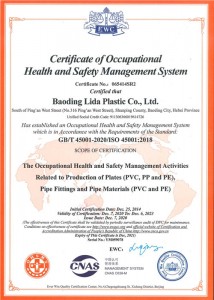डिसेंबर . 15, 2024 01:14 Back to list
hdpe panel
Understanding HDPE Panels Properties, Applications, and Advantages
High-Density Polyethylene (HDPE) panels have emerged as a popular choice across various industries due to their robustness, versatility, and sustainability. These panels, made from high-density polyethylene, a thermoplastic polymer, offer an impressive array of properties that make them suitable for numerous applications. In this article, we will explore the characteristics of HDPE panels, their applications, and the benefits they offer over traditional materials.
Properties of HDPE Panels
HDPE panels are known for their exceptional strength-to-density ratio. The density of HDPE is about 0.95 g/cm³, giving it a lightweight yet robust characteristic. This makes HDPE panels significantly more durable than many other materials, such as wood or lower-density plastics. They possess excellent impact resistance, ensuring they can withstand harsh conditions without showing significant signs of wear or damage.
Another noteworthy property of HDPE panels is their chemical resistance. They can withstand exposure to a wide range of chemicals, including acids and bases, making them ideal for environments like laboratories and industrial facilities where chemical spills can occur. Additionally, HDPE panels are waterproof and resistant to mold and mildew, often used in applications that require hygiene and cleanliness.
HDPE panels can also offer insulation against temperature variations. They remain stable across a wide temperature range, which allows them to maintain their physical properties in extreme weather conditions. This stable performance contributes to their extended lifespan compared to traditional materials, which can warp, crack, or deteriorate with time.
Applications of HDPE Panels
The versatility of HDPE panels opens up a realm of applications across various sectors. In construction and architecture, they are utilized for cladding, roofing materials, and as a structural component in building projects. Their durability and resistance to elements make them an excellent choice for modern architectural designs that require both aesthetic appeal and functional reliability.
In agriculture, HDPE panels are widely used for constructing greenhouses, aquaculture systems, and as liners for ponds. Their waterproof nature and chemical resistance ensure the integrity of such structures, protecting crops and aquatic life from harmful substances that might leach into the water or soil.
hdpe panel

The retail and display industry also benefits from HDPE panels. They are favored for constructing showcases, signage, and point-of-sale displays due to their lightweight nature and the ease of fabrication. Custom colors and designs can be achieved, making them ideal for branding and promotional activities.
Moreover, HDPE panels find their place in the manufacturing of containers, packaging, and shipping materials. Their strong and protective qualities are well-suited for transporting sensitive goods that require robust packaging solutions.
Advantages of HDPE Panels
One of the primary advantages of HDPE panels is their eco-friendliness. As a recyclable material, HDPE contributes to sustainable practices. The recycling process can conserve energy and reduce landfill waste, making it an appealing choice for environmentally-conscious manufacturers and consumers. Furthermore, HDPE panels do not release harmful chemicals into the environment, promoting safer usage within various applications.
Economic considerations play a vital role too. The durability of HDPE panels translates to lower maintenance costs over time, enabling businesses to save on repairs and replacements. Their longevity results in a favorable return on investment, making them a cost-effective choice compared to other materials that might require frequent replacement.
Additionally, HDPE panels are easy to work with. They can be machined, shaped, and welded, enabling manufacturers to design custom solutions tailored to specific needs. This adaptability ensures that HDPE panels can integrate seamlessly into various projects, whether large or small.
Conclusion
In conclusion, HDPE panels represent a remarkable advancement in material technology, offering a combination of strength, versatility, and sustainability. Their unique properties facilitate a wide range of applications across diverse industries, from construction and agriculture to retail and manufacturing. As the demand for eco-friendly and durable materials continues to rise, HDPE panels are poised to play a pivotal role in shaping the future of various sectors. With their myriad advantages, they stand out as a reliable choice for anyone looking to invest in quality materials that promise longevity and performance.
-
HDPE Natural Sheet: Durable, Food-Grade & Versatile Plastic Solutions
NewsAug.27,2025
-
Durable Glossy PVC Rigid Sheet | Premium High-Shine Panels
NewsAug.26,2025
-
Durable PP Rigid Sheet: Lightweight, Chemical Resistant Solutions
NewsAug.21,2025
-
PVC Grey Sheet for Extraction: Chemical Resistant & Durable
NewsAug.19,2025
-
Durable PVC Pipe Fittings for Plumbing & Irrigation Needs
NewsAug.18,2025
-
HDPE Steel Belt Reinforced Spiral Corrugated Pipe | High Strength
NewsAug.17,2025

